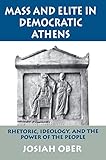Mass and Elite in Democratic Athens : Rhetoric, Ideology, and the Power of the People / Josiah Ober.
Material type: TextPublisher: Princeton, NJ : Princeton University Press, [2009]Copyright date: ©1989Edition: Course BookDescription: 1 online resource (408 p.)Content type:
TextPublisher: Princeton, NJ : Princeton University Press, [2009]Copyright date: ©1989Edition: Course BookDescription: 1 online resource (408 p.)Content type: - 9780691028644
- 9781400820511
- online - DeGruyter
- Issued also in print.
| Item type | Current library | Call number | URL | Status | Notes | Barcode | |
|---|---|---|---|---|---|---|---|
 eBook
eBook
|
Biblioteca "Angelicum" Pont. Univ. S.Tommaso d'Aquino Nuvola online | online - DeGruyter (Browse shelf(Opens below)) | Online access | Not for loan (Accesso limitato) | Accesso per gli utenti autorizzati / Access for authorized users | (dgr)9781400820511 |
Frontmatter -- CONTENTS -- Preface -- Abbreviations -- CHAPTER I. Democracy: Athenian and Modern -- CHAPTER II. History of the Athenian "Constitution": A Diachronic Survey -- CHAPTER III. Public Speakers and Mass Audiences -- CHAPTER IV. Ability and Education: The Power of Persuasion -- CHAPTER V. Class: Wealth, Resentment, and Gratitude -- CHAPTER VI. Status: Noble Birth and Aristocratic Behavior -- CHAPTER VII. Conclusions: Dialectics and Discourse -- Appendix: Catalogue of Speeches and Citation Index -- Select Bibliography -- Index
restricted access online access with authorization star
http://purl.org/coar/access_right/c_16ec
This book asks an important question often ignored by ancient historians and political scientists alike: Why did Athenian democracy work as well and for as long as it did? Josiah Ober seeks the answer by analyzing the sociology of Athenian politics and the nature of communication between elite and nonelite citizens. After a preliminary survey of the development of the Athenian "constitution," he focuses on the role of political and legal rhetoric. As jurymen and Assemblymen, the citizen masses of Athens retained important powers, and elite Athenian politicians and litigants needed to address these large bodies of ordinary citizens in terms understandable and acceptable to the audience. This book probes the social strategies behind the rhetorical tactics employed by elite speakers. A close reading of the speeches exposes both egalitarian and elitist elements in Athenian popular ideology. Ober demonstrates that the vocabulary of public speech constituted a democratic discourse that allowed the Athenians to resolve contradictions between the ideal of political equality and the reality of social inequality. His radical reevaluation of leadership and political power in classical Athens restores key elements of the social and ideological context of the first western democracy.
Issued also in print.
Mode of access: Internet via World Wide Web.
In English.
Description based on online resource; title from PDF title page (publisher's Web site, viewed 30. Aug 2021)


